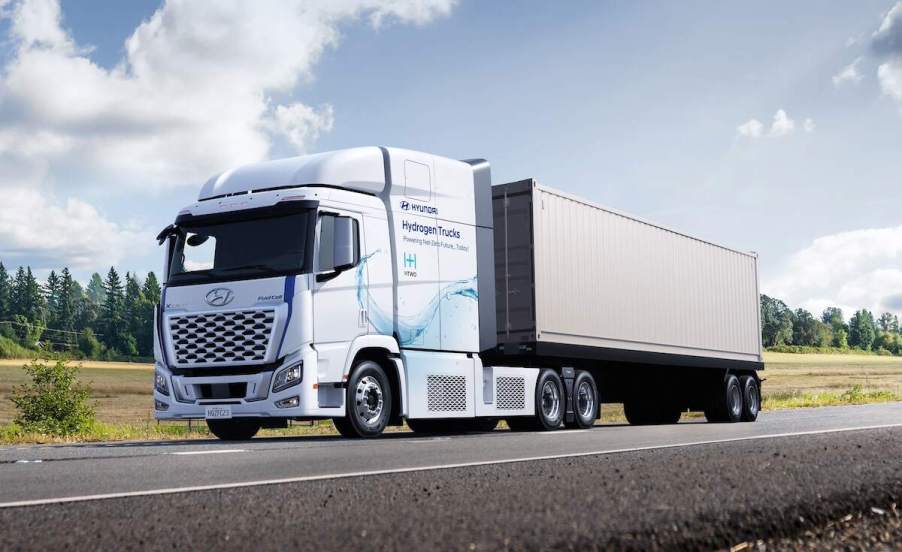
Hyundai’s Fuel Cell Tractor Has an Impressive Range, but Is It Enough?
Hyundai believes the future of commercial vehicle trucking lies with the hydrogen fuel cell. The technology appears safe and reliable, with Hyundai’s fuel cell–equipped tractors logging more than 4 million miles since 2020. Are hydrogen fuel cell semi-trucks destined to take over the trucking industry?
Hyundai’s Xcient fuel cell truck has over 450 miles of range

Hyundai says its Xcient hydrogen fuel cell system–equipped tractors have a range exceeding 450 miles per charge. In addition, they achieve that range while fully loaded. Xcient fuel cell trucks have a gross combined weight of 82,000 pounds, including cargo.
Hyundai uses two 90-kW hydrogen fuel cell systems to power the truck’s 350-kW electric motor. The total power output of 180 kW enables the 6×4 tractor to handle up to 82,000 pounds. However, the U.S. Department of Transportation regulates a tractor-trailer’s gross combined weight limit to 80,000 pounds.
Is this range enough to make the truck practical?

Because the average diesel-powered semi-truck can travel 1,800 miles between fuel stops, a 450-mile range doesn’t seem practical. Big rigs carry 300-gallon fuel tanks and average 6 mpg of diesel fuel to achieve the 1,800-mile range. However, because it takes about eight hours to drive 450 miles, the highways might be safer with limited ranges.
Hyundai operates Xcient fuel cell trucks in five countries: Switzerland, Germany, Israel, Korea, and New Zealand. However, the South Korean company recently announced plans to bring the technology to the United States. This announcement came earlier this year at the Advanced Clean Transportation Expo in Anaheim, California.
Given that the most viable infrastructure for supporting hydrogen fuel cell electric vehicles (FCEVs) is in California, don’t expect to see Xcient-powered trucks venturing outside the Golden State. However, the automaker plans to manufacture the trucks at its Hyundai Motor Group Metaplant America factory, under construction in Georgia.
Regardless, Hyundai’s fuel cell truck is a step in the right direction
Tucking companies and truck drivers might find the limited ranges impractical, but the technology is a step in the right direction. The Driven claims commercial vehicles in this weight category cause “the most CO2 emissions of all freight transport types.” However, the battle between battery-electric power and FCEV is far from settled.
Experts like Auke Hoekstra, a researcher at Eindhoven University of Technology in the Netherlands, believe battery electric trucks like the Tesla Semi are more practical and have a better chance of replacing diesel-powered trucks in the future. On the other hand, Michael Liebreich, Bloomberg New Energy Finance founder, says battery-electric is best suited for short-range trucking, but “long-range hydrogen trucks have a chance.”
The most exciting aspect of the debate between battery and hydrogen power is the presence of viable options. Only recently has any power source appeared capable of replacing diesel in the trucking industry. While both alternative sources face challenges, with companies like Hyundai and Tesla committing resources to infrastructure and developing technologies, the future of trucking is changing.






